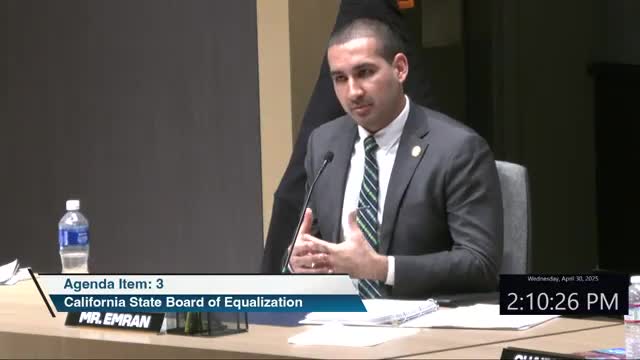Humboldt County Assessor Discusses Technology Needs Amid Budget Deficits
May 01, 2025 | Board of Equalization, Other State Agencies, Executive, California
This article was created by AI summarizing key points discussed. AI makes mistakes, so for full details and context, please refer to the video of the full meeting. Please report any errors so we can fix them. Report an error »

In a recent meeting of the California Board of Equalization (BOE), held on April 30, 2025, officials gathered to address pressing issues surrounding property tax refunds and the integration of technology in county assessments. The atmosphere was charged with a sense of urgency as board members and county assessors discussed the challenges faced by local governments in managing tax-related processes.
One of the primary topics was the delays in property tax refunds, which have become a significant concern for taxpayers and county officials alike. A board member highlighted the complexities involved, noting that issues often stem from record retention problems. "Sometimes there just isn't a record of the payor," they explained, suggesting that clearer mandates on record-keeping could alleviate some of these challenges. The discussion also touched on the role of escrow and title companies in the refund process, with proposals for new laws to clarify who should receive refunds when documentation is lacking.
As the meeting progressed, the focus shifted to the integration of technology in county assessment processes. The Honorable Howard Leahy, Assessor from Humboldt County, shared his county's struggles with outdated systems. Currently, many counties rely on basic tools like Microsoft Excel to track assessment appeals, which can be cumbersome and inefficient. Leahy emphasized the need for a streamlined portal to manage these appeals more effectively, particularly for smaller counties that lack the resources of their larger counterparts. "Incorporating some type of technology... would be so much more efficient for us," he stated, underscoring the critical need for funding to support such initiatives.
The conversation revealed a broader concern among counties facing budget deficits, with Leahy mentioning a staggering $14 million shortfall in his county's upcoming budget. This financial strain complicates efforts to adopt new technologies that could improve efficiency and service delivery. The board acknowledged that securing grants and additional funding would be essential for counties to modernize their processes.
As the meeting concluded, the board members expressed a commitment to exploring solutions that would not only address the immediate issues of tax refunds and technology integration but also pave the way for a more efficient and equitable system for all Californians. The discussions highlighted the ongoing challenges faced by local governments and the importance of collaboration and innovation in overcoming them.
One of the primary topics was the delays in property tax refunds, which have become a significant concern for taxpayers and county officials alike. A board member highlighted the complexities involved, noting that issues often stem from record retention problems. "Sometimes there just isn't a record of the payor," they explained, suggesting that clearer mandates on record-keeping could alleviate some of these challenges. The discussion also touched on the role of escrow and title companies in the refund process, with proposals for new laws to clarify who should receive refunds when documentation is lacking.
As the meeting progressed, the focus shifted to the integration of technology in county assessment processes. The Honorable Howard Leahy, Assessor from Humboldt County, shared his county's struggles with outdated systems. Currently, many counties rely on basic tools like Microsoft Excel to track assessment appeals, which can be cumbersome and inefficient. Leahy emphasized the need for a streamlined portal to manage these appeals more effectively, particularly for smaller counties that lack the resources of their larger counterparts. "Incorporating some type of technology... would be so much more efficient for us," he stated, underscoring the critical need for funding to support such initiatives.
The conversation revealed a broader concern among counties facing budget deficits, with Leahy mentioning a staggering $14 million shortfall in his county's upcoming budget. This financial strain complicates efforts to adopt new technologies that could improve efficiency and service delivery. The board acknowledged that securing grants and additional funding would be essential for counties to modernize their processes.
As the meeting concluded, the board members expressed a commitment to exploring solutions that would not only address the immediate issues of tax refunds and technology integration but also pave the way for a more efficient and equitable system for all Californians. The discussions highlighted the ongoing challenges faced by local governments and the importance of collaboration and innovation in overcoming them.
View full meeting
This article is based on a recent meeting—watch the full video and explore the complete transcript for deeper insights into the discussion.
View full meeting
